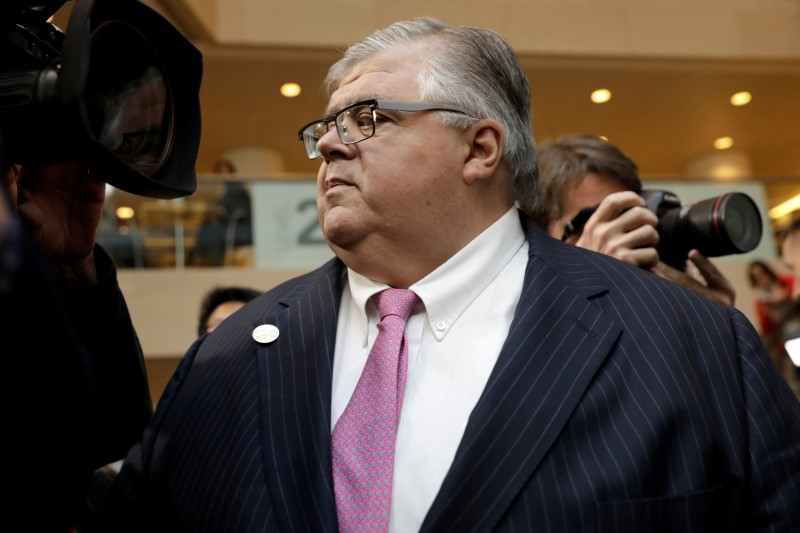 © Reuters. BIS General Manager Agustin Carstens leaves after G-20 finance ministers and central banks governors family photo during the IMF/World Bank spring meeting in Washington
© Reuters. BIS General Manager Agustin Carstens leaves after G-20 finance ministers and central banks governors family photo during the IMF/World Bank spring meeting in WashingtonJACKSON HOLE, Wyo. (Reuters) – Agustin Carstens, general manager of the Bank of International Settlements, on Saturday delivered a scathing critique of rising protectionism, a not-so-subtle rebuke to U.S. President Donald Trump’s use of tariffs and trade talks to wring concessions from China, Mexico and many other countries.
Reversing globalization “could increase prices, raise unemployment and crimp growth,” Carstens, the former head of Mexico’s central bank, told fellow former and current central bankers at the Kansas City Federal Reserve Bank’s annual economic symposium here.
Higher tariffs could drive up U.S. inflation and force the Fed to raise rates, driving up the dollar and hurting both U.S. exporters and emerging market economies in the process, Carstens said
Protectionism also threatens “to unsettle financial markets and put a drag on firms’ capital spending, as investors take fright and financial conditions tighten,” he said.
The BIS released a research paper at the same time as Carstens’ speech that estimated revoking the North American Free Trade Agreement, as Trump has threatened, would mean a loss to gross domestic product of $37 billion in Canada, $22 billion in Mexico, and $40 billion in the United States, with non-tariff trade barriers accounting for the lion’s share of the losses. Wages would also fall across North America, the research found.
Mexican and U.S. negotiators have narrowed trade-pact differences in recent days, and Canada will join trade talks once those have been resolved, but the overall future of NAFTA remains unclear.
The United States and China have also been wrangling over trade issues. U.S. and Chinese officials ended two days of talks on Thursday with little progress as their trade war escalated with activation of another round of dueling tariffs on $16 billion worth of each country’s goods.
Even as Fed Chair Jerome Powell has signaled gradual rate hikes ahead, he and other policymakers have largely stepped gingerly around the effect of rising trade frictions on the U.S. economy and monetary policy.
So far, they say, the impact of the tariffs themselves, and related currency gyrations in some countries including Turkey, are not slowing the U.S. economy, and therefore do not require a response.
But, speaking at the final panel in the two-day meeting that examined market structures’ impact on inflation and other metrics that central bankers follow closely, Carstens warned that central bankers ignore trade skirmishes at their peril.
Coming from a fellow former central banker who is now head of the bank for central bankers, the message may resonate.
“Policymakers in advanced economies should not shrug off the growing evidence that abrupt exchange rate depreciations reduce investment and economic growth in emerging market economies,” he said. “This has implications for everybody, in that weaker economic activity reduces demand for exports from advanced economies.”
“In the long term, protectionism will bring not gain but only pain,” Carstens said. “Not just for the United States, but for us all.”
Source: Investing.com





























